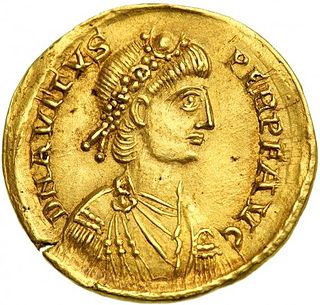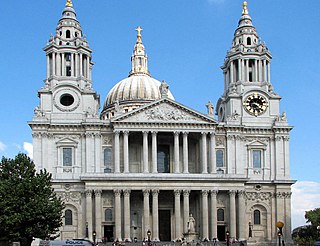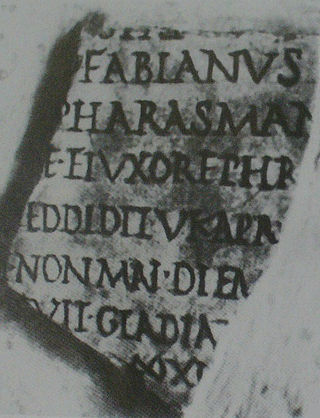Related Research Articles

Year 457 (CDLVII) was a common year starting on Tuesday of the Julian calendar. At the time, it was known as the Year of the Consulship of Constantinus and Rufus. The denomination 457 for this year has been used since the early medieval period, when the Anno Domini calendar era became the prevalent method in Europe for naming years.

Glycerius was Roman emperor of the West from 473 to 474. He served as comes domesticorum during the reign of Olybrius, until Olybrius died in November 472. After a four-month interregnum, Glycerius was proclaimed as emperor in March 473 by Gundobad, the magister militum and power behind the throne. Very few of the events of his reign are known other than that an attempted invasion of Italy by the Visigoths was repelled by local commanders, diverting them to Gaul. Glycerius also prevented an invasion by the Ostrogoths through diplomacy, including a gift of 2,000 solidi.

The pituitary gland or hypophysis is an endocrine gland in vertebrates. In humans, the pituitary gland is located at the base of the brain, protruding off the bottom of the hypothalamus. The human pituitary gland is oval shaped, about 1 cm in diameter, 0.5–1 gram (0.018–0.035 oz) in weight on average, and about the size of a kidney bean.

Eparchius Avitus was Roman emperor of the Western Empire from July 455 to October 456. He was a senator of Gallic extraction and a high-ranking officer both in the civil and military administration, as well as Bishop of Piacenza.

Nicander of Colophon was a Greek poet, physician, and grammarian. He was born at Claros, near Colophon, where his family held the hereditary priesthood of Apollo. He flourished under Attalus III of Pergamum.

The dean of St Paul's is a member of, and chair of the Chapter of St Paul's Cathedral in London in the Church of England. The dean of St Paul's is also ex officio dean of the Order of the British Empire.

The buccinator is a thin quadrilateral muscle occupying the interval between the maxilla and the mandible at the side of the face. It forms the anterior part of the cheek or the lateral wall of the oral cavity.

The anconeus muscle is a small muscle on the posterior aspect of the elbow joint.

Euphemia, known as Euphemia the All-praised in the Eastern Orthodox Church, was a virgin martyr, who died for her faith at Chalcedon in 303 AD.

Libius Severus, sometimes enumerated as Severus III, was Western Roman emperor from November 19, 461 to his death on November 14, 465. A native of Lucania, Severus was the fourth of the so-called "Shadow Emperors" who followed the deposition of the Valentinianic dynasty in 455. He ruled for just under four years, attaining the throne after his predecessor, Majorian, was overthrown by his magister militum, Ricimer. Severus was the first of a series of emperors who were highly dependent on the general, and it is often presumed that Ricimer held most of the de facto power during Severus' reign
Anonymus Valesianus is the conventional title of a compilation of two fragmentary vulgar Latin chronicles, named for its modern editor, Henricus Valesius, who published the texts for the first time in 1636, together with his first printed edition of the Res Gestae of Ammianus Marcellinus. The two fragments are not related, one being from the fourth century and the other from the sixth. The only connection between the two fragments is their presence in the same manuscript and their history of being edited together. When Henricus' brother Hadrian re-edited the Anonymus in an edition of Ammianus Marcellinus in 1681, it was the first time that the two excerpts were clearly separated.
Remistus was a general of the Western Roman Empire and commander-in-chief of the army under Emperor Avitus.
The Fasti vindobonenses are two sets of late antique consular annals ("fasti"), found in the Vindobonensis manuscript MS. 3416, together with the Chronography of 354. They were previously known as Anonymus Cuspiniani, since they were published by Johannes Cuspinianus in 1553, and are part of the Consularia Italica collection.

The Fasti Ostienses are a calendar of Roman magistrates and significant events from 49 BC to AD 175, found at Ostia, the principal seaport of Rome. Together with similar inscriptions, such as the Fasti Capitolini and Fasti Triumphales at Rome, the Fasti Ostienses form part of a chronology known as the Fasti Consulares, or Consular Fasti.
Thomas Birch DCL was the Archdeacon of Lewes from 1823 until 1840. Birch was born in 1766, son of Rev. Thomas Birch, who was Rector of Thoresby in Lincolnshire. He was educated at Merchant Taylors' School, Northwood until 1785 when he was elected a fellow at St John's College, Oxford. He was also Dean of Battle, Vicar of Westfield, Sussex, Vicar of Bexhill, Sussex, and chaplain to the House of Correction in Battle, East Sussex. Birch was highly respected and in his office as Dean of Battle in 1820 he performed the baptism of the second son of Sir Godfrey Webster, 5th Baronet in the presence of the child's godfather, Prince Augustus Frederick, Duke of Sussex.
Rufius Postumius Festus was a Roman aristocrat who lived during the Late Roman Empire. Festus was the last consul appointed by an Emperor in the West. The next consul appointed in the West was Caecina Decius Maximus Basilius, whom king Odoacer appointed in 480, eight years after Festus.
Excerpta may refer to:

The Excerpta Latina Barbari, also called the Chronographia Scaligeriana, is a late antique historical compilation, originally composed in Greek in AD 527–539 but surviving only in a Latin translation from the late 8th century. The identities of the author/compiler of the original and of the translator unknown.
References
- ↑ Burgess, R.W. (2013). "THE DATE, PURPOSE, AND HISTORICAL CONTEXT OF THE ORIGINAL GREEK AND THE LATIN TRANSLATION OF THE SO-CALLED "EXCERPTA LATINA BARBARI"". Traditio . 68: 1–56. Retrieved November 1, 2024.